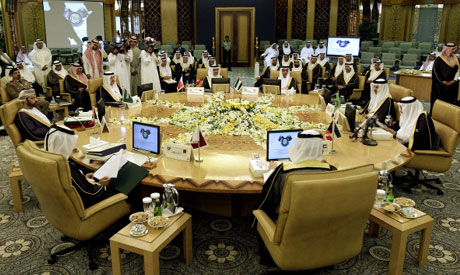
A general view of the Gulf Cooperation Council (GCC) during their meeting in Riyadh, Saudi Arabia, Wednesday, May 2, 2012
Saudi Arabia, the United Arab Emirates and Bahrain said Monday they will reinstate their ambassadors to Qatar after withdrawing them in an unprecedented move eight months ago.
The six-nation Gulf Cooperation Council, which also includes Kuwait and Oman, had been rattled by the rift in relations that was widely seen as a result of Qatar's support for Islamist groups like the Muslim Brotherhood throughout the region. The UAE and Saudi Arabia perceive the Brotherhood as a threat to their political systems. Both have branded the 86 year-old organization as a "terrorist group".
After several rounds of high-level talks and months of pressure, Qatar recently forced top Egyptian Muslim Brotherhood figures to leave and seek refuge elsewhere. Additionally, pro-Brotherhood cleric Youssef al-Qaradawi has not appeared on the pulpit in Qatar since ambassadors were withdrawn.
State media and government-linked commentators across the Gulf had been calling for an end to the diplomatic spat in the face of emerging threats from the Islamic State group in Iraq and Syria. Several Arab countries, including Saudi Arabia, the UAE, Bahrain and Qatar, are playing a role in the U.S.-led military coalition conducting airstrikes against the extremist group.
The decision to reinstate ambassadors came after rulers of the GCC member-states met in an emergency session in Saudi Arabia late Sunday. Among those present were Saudi King Abdullah and Qatari Emir Sheikh Tamim bin Hamad Al Thani.
The GCC leadership said the meeting was called to "consolidate the spirit of sincere cooperation, to confirm the mutual destiny and aspirations of the Gulf Cooperation Council, the unity of its people and close rapprochement."
The statement, released early Monday, heralded the "opening of a new page" in relations with the reinstatement of ambassadors. The move paves the way for the GCC's annual summit to be held in Doha, Qatar next month.
A regional security agreement drawn up late last year had called on Qatar to stop supporting organisations that threaten the Gulf's stability and to stop interfering in other nations' politics. Saudi Arabia, the UAE and Bahrain said in March that withdrawing their ambassadors was a move to protect their security.
However, Egypt has welcomed the UAE's move. Foreign Ministry spokesman Badr Abdel-Aty told that Egypt welcomes this step, praising cooperation between the two countries.
Arab League Secretary General Nabil El-Araby said he also supports the UAE's decision.
The oil-rich Gulf neighbors are strong supporters of Egyptian President Abdel-Fattah el-Sisi, who was elected this year.
Saudi Arabia, the United Arab Emirates and Bahrain said Monday they will reinstate their ambassadors to Qatar after withdrawing them in an unprecedented move eight months ago.
The six-nation Gulf Cooperation Council, which also includes Kuwait and Oman, had been rattled by the rift in relations that was widely seen as a result of Qatar's support for Islamist groups like the Muslim Brotherhood throughout the region. The UAE and Saudi Arabia perceive the Brotherhood as a threat to their political systems. Both have branded the 86 year-old organization as a "terrorist group".
After several rounds of high-level talks and months of pressure, Qatar recently forced top Egyptian Muslim Brotherhood figures to leave and seek refuge elsewhere. Additionally, pro-Brotherhood cleric Youssef al-Qaradawi has not appeared on the pulpit in Qatar since ambassadors were withdrawn.
State media and government-linked commentators across the Gulf had been calling for an end to the diplomatic spat in the face of emerging threats from the Islamic State group in Iraq and Syria. Several Arab countries, including Saudi Arabia, the UAE, Bahrain and Qatar, are playing a role in the U.S.-led military coalition conducting airstrikes against the extremist group.
The decision to reinstate ambassadors came after rulers of the GCC member-states met in an emergency session in Saudi Arabia late Sunday. Among those present were Saudi King Abdullah and Qatari Emir Sheikh Tamim bin Hamad Al Thani.
The GCC leadership said the meeting was called to "consolidate the spirit of sincere cooperation, to confirm the mutual destiny and aspirations of the Gulf Cooperation Council, the unity of its people and close rapprochement."
The statement, released early Monday, heralded the "opening of a new page" in relations with the reinstatement of ambassadors. The move paves the way for the GCC's annual summit to be held in Doha, Qatar next month.
A regional security agreement drawn up late last year had called on Qatar to stop supporting organisations that threaten the Gulf's stability and to stop interfering in other nations' politics. Saudi Arabia, the UAE and Bahrain said in March that withdrawing their ambassadors was a move to protect their security.
However, Egypt has welcomed the UAE's move. Foreign Ministry spokesman Badr Abdel-Aty told that Egypt welcomes this step, praising cooperation between the two countries.
Arab League Secretary General Nabil El-Araby said he also supports the UAE's decision.
The oil-rich Gulf neighbors are strong supporters of Egyptian President Abdel-Fattah el-Sisi, who was elected this year.

No comments:
Post a Comment
Note: Only a member of this blog may post a comment.